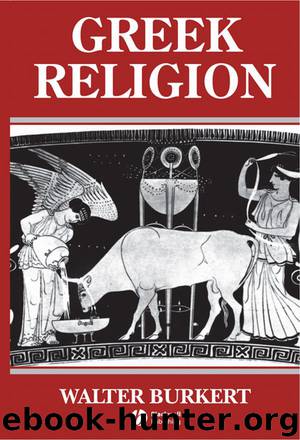Greek Religion by Walter Burkert

Author:Walter Burkert
Language: eng
Format: mobi, epub
Publisher: Wiley
Published: 2013-05-29T20:00:00+00:00
3 SOCIAL FUNCTIONS OF CULT
3.1 Gods between Amorality and Law
In the struggle of Christianity against the pagan gods, one of the most successful arguments was the accusation of immorality, for the defenders of the old order themselves could not avoid admitting its justification; most vulnerable were the unbridled love-affairs of the gods and most disturbing was Zeus’ overthrow of his own father. For many centuries previously the Greeks themselves had been formulating this criticism of the Homeric gods and had found nothing in their defence beyond the unconvincing arts of allegory.1 When contemplating this, the modern observer may concur with the judgement of history and find in its moral weakness one of the principal reasons for the decline and dissolution of ancient religion;2 at the same time, of course, he may also take a peculiar aesthetic delight in the amorality of the Olympians. And yet the problem here is more complex and more profound.
Criticism of Homer is very old. ‘Much the poets lie’ sounds already in Solon like a proverbial saying;3 and in Hesiod the Muses’ admission that they know how to tell ‘many lies’4 seems to be directed against the Homeric tales of the gods. Towards the end of the sixth century the sharp and final judgement was formulated by Xenophanes: ‘Homer and Hesiod have attributed to the gods all things which among men are reproach and blame: stealing, adultery and mutual deception.’5 Pindar dissociates himself from myths which make the gods into cannibals.6 In Euripides, the gods themselves are drawn into the equivocation: ‘If the gods do anything shameful, they are not gods.’7 And when Hera out of petty jealousy cruelly destroys Heracles, the question is asked: ‘To such a god, who would pray?’8 Plato had only to draw these strains together and systematize them in order to forbid all this, and especially all Homer, in his ideal state.9
And yet the most important Greek temples and the most sublime statues of the gods were created generations after Xenophanes. People did continue to pray to these gods, Greek religion was practised for 800 years after Xenophanes and disappeared only at the end of the ancient world under massive state pressure.10 Quite clearly that criticism had touched only the surface, not the roots.
A comfortable expedient was found in a piece of casuistry: there is a theology of the poets which need not be believed, and at the same time a theology of the polis which is very much a civic duty.11 Then there is also the natural theology of the philosophers which makes an eminent claim to truth and which may be regarded either in a spirit of intellectual commitment or with sceptical reserve.
What is astonishing here is the easy assumption that the polis religion is able to achieve what the world of gods apparently cannot: that it is the foundation of moral order. Sarcastically, Aristotle remarks that the ruler should display great piety, ‘because people are less afraid of suffering any illegal treatment from men of this sort.’12 The
Download
This site does not store any files on its server. We only index and link to content provided by other sites. Please contact the content providers to delete copyright contents if any and email us, we'll remove relevant links or contents immediately.
Cecilia; Or, Memoirs of an Heiress — Volume 1 by Fanny Burney(32549)
Cecilia; Or, Memoirs of an Heiress — Volume 2 by Fanny Burney(31948)
Cecilia; Or, Memoirs of an Heiress — Volume 3 by Fanny Burney(31932)
The Great Music City by Andrea Baker(31917)
We're Going to Need More Wine by Gabrielle Union(19036)
All the Missing Girls by Megan Miranda(15964)
Pimp by Iceberg Slim(14489)
Bombshells: Glamour Girls of a Lifetime by Sullivan Steve(14058)
For the Love of Europe by Rick Steves(13948)
Talking to Strangers by Malcolm Gladwell(13350)
Norse Mythology by Gaiman Neil(13349)
Fifty Shades Freed by E L James(13233)
Mindhunter: Inside the FBI's Elite Serial Crime Unit by John E. Douglas & Mark Olshaker(9324)
Crazy Rich Asians by Kevin Kwan(9280)
The Lost Art of Listening by Michael P. Nichols(7494)
Enlightenment Now: The Case for Reason, Science, Humanism, and Progress by Steven Pinker(7306)
The Four Agreements by Don Miguel Ruiz(6746)
Bad Blood by John Carreyrou(6613)
Weapons of Math Destruction by Cathy O'Neil(6267)
